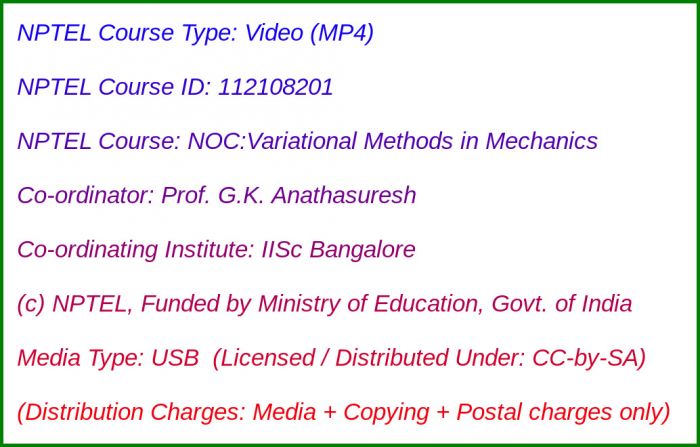
Media Storage Type : 32 GB USB Stick
NPTEL Subject Matter Expert : Prof. G.K. Anathasuresh
NPTEL Co-ordinating Institute : IISc Bangalore
NPTEL Lecture Count : 44
NPTEL Course Size : 13 GB
NPTEL PDF Text Transcription : Available and Included
NPTEL Subtitle Transcription : Available and Included (SRT)
Lecture Titles:
Lecture 1 - Classification of optimization problems and the place of Calculus of Variations in it - Part I
Lecture 2 - Classification of optimization problems and the place of Calculus of Variations in it - Part II
Lecture 3 - Genesis of Calculus of Variations - Part I
Lecture 4 - Genesis of Calculus of Variations - Part II
Lecture 5 - Formulation of Calculus of Variations problems in geometry and mechanics and design - Part I
Lecture 6 - Formulation of Calculus of Variations problems in geometry and mechanics and design - Part II
Lecture 7 - Unconstrained minimization in one and many variables - Part I
Lecture 8 - Unconstrained minimization in one and many variables - Part II
Lecture 9 - Constrained minimization KKT conditions - Part I
Lecture 10 - Constrained minimization KKT conditions - Part II
Lecture 11 - Sufficient conditions for constrained minimization - Part I
Lecture 12 - Sufficient conditions for constrained minimization - Part II
Lecture 13 - Mathematical preliminaries function, functional, metrics and metric space, norm and vector spaces - Part I
Lecture 14 - Mathematical preliminaries function, functional, metrics and metric space, norm and vector spaces - Part II
Lecture 15 - Function spaces and Gateaux variation
Lecture 16 - First variation of a functional Freche?t differential and variational derivative
Lecture 17 - Fundamental lemma of calculus of variations and Euler Lagrange equations - Part I
Lecture 18 - Fundamental lemma of calculus of variations and Euler Lagrange equations - Part II
Lecture 19 - Extension of Euler-Lagrange equations to multiple derivatives
Lecture 20 - Extension of Euler-Lagrange equations to multiple functions in a functional
Lecture 21 - Global Constraints in calculus of variations - Part I
Lecture 22 - Global Constraints in calculus of variations - Part II
Lecture 23 - Local (finite subsidiary) constrains in calculus of variations - Part I
Lecture 24 - Local (finite subsidiary) constrains in calculus of variations - Part II
Lecture 25 - Size optimization of a bar for maximum stiffness for given volume - Part I
Lecture 26 - Size optimization of a bar for maximum stiffness for given volume - Part II
Lecture 27 - Size optimization of a bar for maximum stiffness for given volume - Part III
Lecture 28 - Calculus of variations in functionals involving two and three independent variables - Part I
Lecture 29 - Calculus of variations in functionals involving two and three independent variables - Part II
Lecture 30 - General variation of a functional, transversality conditions. Broken extremals, Wierstrass-Erdmann corner conditions - Part I
Lecture 31 - General variation of a functional, transversality conditions. Broken extremals, Wierstrass-Erdmann corner conditions - Part II
Lecture 32 - Variational (energy) methods in statics; principles of minimum potential energy and virtual work
Lecture 33 - General framework of optimal structural designs - Part I
Lecture 34 - General framework of optimal structural designs - Part II
Lecture 35 - Optimal structural design of bars and beams using the optimality criteria method
Lecture 36 - Invariants of Euler-Lagrange equations and canonical forms
Lecture 37 - NoetherÂ’s theorem
Lecture 38 - Minimum characterization of Sturm-Liouville problems
Lecture 39 - Rayleigh quotient for natural frequencies and mode shapes of elastic systems
Lecture 40 - Stability analysis and buckling using calculus of variations
Lecture 41 - Strongest (most stable) column
Lecture 42 - Dynamic compliance optimization
Lecture 43 - Electro-thermal-elastic structural optimization
Lecture 44 - Formulating the extremization problem starting from the differential equation, self-adjointness of the differential operator, and methods to deal with conservative and dissipative system

